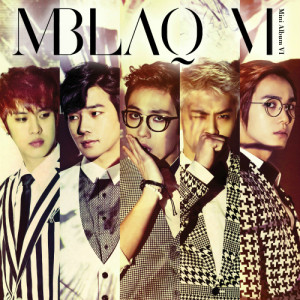 A group who debuted in 2009 as Rain‘s handcrafted idols, MBLAQ released their last album, Sexy Beat, almost a year ago. These boys living in absolute quality have made numerous appearances in variety shows as well as dramas in recent years, but, unfortunately, their music show wins can be counted on one hand (of course, music show wins aren’t an accurate measure of success, but view them as a means of comparison here).
A group who debuted in 2009 as Rain‘s handcrafted idols, MBLAQ released their last album, Sexy Beat, almost a year ago. These boys living in absolute quality have made numerous appearances in variety shows as well as dramas in recent years, but, unfortunately, their music show wins can be counted on one hand (of course, music show wins aren’t an accurate measure of success, but view them as a means of comparison here).
With unique concepts and styles, MBLAQ’s music has been consistently satisfying. This time, they’re hoping to stay in the spotlight with their sixth mini album, Broken, released on March 24.
Usually known for their powerful dance singles, MBLAQ’s last title song that fell into the ballad category was “Cry,” from their 2011 studio album. This mini, however, offers a variety of ballads from stronger beats to quieter surprises, none of which disappoint.
We begin the album with “Broken,” an intro piece cowritten by Thunder, who surprised me with his change in style for this album. The repetition of the cello notes drag out to create an impression of something — or someone — that’s not functioning normally. The falsettos also add a layer of supernaturalism, as if the man has been placed in a temporarily detached dimension as a result of his breakup. The lyrics describe the end of an love and the beginning of a broken heart, making this song the perfect intro for MBLAQ’s journey to escape from their “poison love.”
After the intro is the title song, “Be a Man.” Unlike most promoted stages nowadays, the R&B sound dominates here, thanks to singer-songwriter Wheesung. The acoustics paired with the solo voice at the beginning elongate the feeling of isolation initially introduced in “Broken.”
[youtube https://www.youtube.com/watch?v=ygCm0g85gSU]Prior to the release of the album, a representative from J. Tune Camp revealed their intention of painting MBLAQ as masculine and cold as opposed to sad and soft — the usual characteristics that surface after the end of a relationship. “Be a Man” describes the usual breakup story, but contrary to the J. Tune’s announcement, the man represented in the song cannot actually achieve what he aimed to do:
Should I be a man and let you go? Should I let go of your tightly held hand?
Should I hug you goodbye? But in the end, I couldn’t do any of that.
Our protagonist is attempting to convince himself to stay strong and avoid being affected by the relationship. Perhaps, though, MBLAQ is telling us that everyone suffers to a similar degree, and therefore there is no real “manly” way to handle a breakup.
 Next, we have “Our Relationship,” a pre-release that acts perfectly as a flashback. At the point in time of this song, our lovers haven’t separated yet and the man is merely worrying over what their future holds. He promises to love the girl more and pleads for her not to leave him, which all just adds to the heartbreak we already know will happen. Nevertheless, “Our Relationship” has a more consonant melody, along with finger-snaps and whistling, that reflects the glimmer of hope the man sees.
Next, we have “Our Relationship,” a pre-release that acts perfectly as a flashback. At the point in time of this song, our lovers haven’t separated yet and the man is merely worrying over what their future holds. He promises to love the girl more and pleads for her not to leave him, which all just adds to the heartbreak we already know will happen. Nevertheless, “Our Relationship” has a more consonant melody, along with finger-snaps and whistling, that reflects the glimmer of hope the man sees.
We continue the melancholy in the present with another track composed by Thunder, “12 Months.” This time, however, we jump through time to one year after the breakup. During these months, the man desperately tried to forget his lover, but he’s still having trouble doing so. The faster beat in the chorus creates the impression of a fast forwarding motion, placing listeners in a time machine of sorts to experience the pain of the past 12 months. The first listen had me doubting the quality of the chorus in comparison to the verses, but a few more plays reveals the song’s emotion and quality.
“Key,” the only track on the album that did not have any participation by the members in its composition process, changes up the style a bit with a steady bass. The slow start on the piano that escalates to the chorus represents, in a way, the worry-turned-despair the man feels seeing the girl he loves getting hurt. And the girl in “Key” whose heart the man longs to be the key to could be a new love interest or the same lover from the previous tracks. Either way, the beauty of this song has probably successfully become the key to many listeners’ hearts.
 Already known for his regular participation in MBLAQ’s music, G.O doesn’t make his songwriting appearance in Broken until the last two tracks.
Already known for his regular participation in MBLAQ’s music, G.O doesn’t make his songwriting appearance in Broken until the last two tracks.
“Because There Are Two” follows the breakup theme present in every track thus far, but the man is the one at fault for the end of the relationship here. As a result, he wishes he could go back and appreciate his lover more.
People usually obsess over their past
I didn’t know I’d regret because I didn’t know how to love
I think you’ve left me, I think fate is punishing me
G.O’s voice definitely dominates in this song, and Mir‘s rap is unforgettable as well. The song reminds me of the two members’ previous collaboration, also penned by G.O. “Because There Are Two,” however, switches out some innocence for a sexier feel even during the intro, which is accented by heavy breathing and strings flirting with the piano. Although the story told by the lyrics here abruptly switch up the theme of the album, the solidness of G.O’s composition finishes off the full tracks of Broken nicely.
We began the mini album with Thunder’s composition and finish with a G.O piece. “Still With You” is the outro, and even though I’m not a fan of lyric-less tracks taking up space on an album, I can’t think of a better finish for Broken. The melody is amazing and would have meshed well with MBLAQ’s vocals to make for another great track, but just the music itself delicately hints at the future of the man who’s experienced pain throughout the previous five tracks.
The lack of lyrics here leaves the story open-ended; we don’t know if he ever gets over the girl(s). From the faster tempo and electronic sound, it seems like we’re in the midst of traveling to the future. Shall we wait patiently for their repackaged album?
 Overall, Broken centers more around attempting to keep oneself together while fighting growing fractures and cracks instead of literally breaking down, as the title implies. The tracks fit together like a puzzle to give off a drama-esque feel, with a flashback here and a forward jump there.
Overall, Broken centers more around attempting to keep oneself together while fighting growing fractures and cracks instead of literally breaking down, as the title implies. The tracks fit together like a puzzle to give off a drama-esque feel, with a flashback here and a forward jump there.
And let’s not forget the two main lessons we’ve learned from MBLAQ through this album: 1) no matter how much you try to be a man, you will fail, and 2) no more cry.
Rating: 4.4/5
(J. Tune Camp, YouTube [1])


